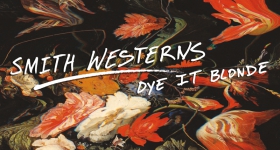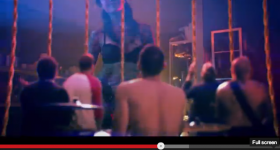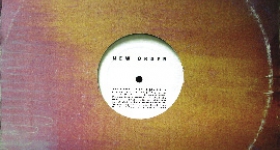SOMEWHERE BETWEEN singing and rapping, somewhere amongst the gritty cadence of James Brown, the spitfire delivery of Busta Rhymes and the jazzy ingenuity of Pharcyde, San Francisco Bay Area rapper Lyrics Born is part of a force bringing classic hip-hop back.
His latest solo release, Overnite Encore, is a live album compiled from performances in Sydney and Melbourne, Australia, as part of a 2005 tour. The album reverberates with elements of funk, dub and rock topped off with the voice of oldschool soul in Filipina singer Joyo Velarde, Lyrics Born's wife and a Quannum recording artist.
Overnite Encore, which was released in October and includes amped up versions of his biggest hits such as "Lady Don't Tek No" and "Callin' Out," is a way to let fans see another side of the performer. With 150 shows in one year, live performances are a huge part of his life. "I want to show people that I'm multidimensional-I don't want to be seen as only a studio artist," he says.
The rapper, who is of Japanese and Italian descent, is ready to show the world just how multidimensional he is.
Lyrics Born (gov'ment name Tom Shimura) was born in Tokyo, but raised in Berkeley, CA from the age of six, where he moved as a result of his parents' divorce.
His lifelong affair with hip-hop started soon after the move, with a 2nd grade awakening on the playground.
"I remember hearing kids singing 'Rapper's Delight' and I learned the words to the song before I ever actually heard it on the radio," he says. "The experience was pivotal for me to know I wanted to be an artist."
For the next few years he filled tattered notebooks with rhymes. By the time he entered college at University of California, Davis in the fall of 1990, he had been rapping for five years and was itching to take his wordsmithing to the next level.
As luck would have it, opportunity, or perhaps fate, came knocking on his door, fivefold.
He connected with Chief Xcel and the Gift of Gab, who had just created the group Blackalicious, DJ Shadow, Lateef the Truth Speaker and DJ Zen (writer Jeff Chang). College radio station KDVS was their stomping ground. The crew would later become Solesides Records and develop acts synonymous with underground hip-hop.
"We all realized we were in the same situation-shopping demo tapes just trying to get heard," Lyrics Born says. "If we didn't put out our music ourselves, no one would hear us. We formed Solesides out of necessity."
The startup indie label's debut featured DJ Shadow's "Entropy" on one side and "Send Them" by Asia Born, Lyrics Born's original moniker, on the other. It was received with mixed reactions.
"People thought it was dope, kind of different. They got caught up wondering why we weren't signed," he recalls. "But once they really listened to our records, opinions started changing."
Though the label started off rocky, the Solesides crew pushed on through trial and error, holding various day jobs to support themselves while trying to keep their fledging label alive.
"We had to make it," Lyrics Born says. "I held terrible office jobs and I am the furthest thing from a 9-to-5 guy."
By 1997, the crew was well on its way to success. A year earlier, DJ Shadow released the critically acclaimed album Endtroducing, which would make the Guinness Book of World Records as the "First Completely Sampled Album."
As a label, Solesides crashed and burned. But from its ashes rose Quannum Projects, with Lyrics Born and Lateef the Truth Speaker releasing Latyrx The Album and selling 30,000 copies. Lyrics Born released his solo debut, Later That Day, in 2003.
"It was pretty intense-I couldn't hide behind the group anymore," he says. "I wanted to come out on fire; of course I was hypercritical of the album, but in the end, I knew I did the best I could."
The album peaked at No. 40 on Billboard's Top Independent Albums chart and the likes of Rolling Stone gave the album rave reviews, calling it "the rare hip-hop album that's as free and fun as it is tight."
Beyond critical acclaim, Later That Day showcased the musician's business savoir faire. The party track "Callin' Out" was featured in Diet Coke commercials and EA Sports games, catapulting the song and the album to crossover commercial success.
"People still talk about the commercial even though it was two years ago," he laughs. "And as far as selling out, I don't think that's what I did. All I did was even the playing field because I didn't have the resources that an artist on a large label would have."
It seems he hasn't let the success dilute his style-old-school hip-hop and lyrics for the political movement of the backpack-rap nerds, all embedded in music that keeps the hedonistic masses moving.
And he doesn't let being one of the few Asian Americans garnering attention in the game affect his game plan. In fact, he didn't really think about it until recently.
"Being an Asian in hip-hop is not that unusual in the Bay Area and it's never been a problem with fans or my peers," he explains. "I didn't realize I was different until I went on tour."
What he realized was that he wasn't just fighting stereotypes as an Asian man, but because he doesn't rap about rapping, guns or violence, and his lyrics aren't overtly sexual, he was fighting stereotypes about hip-hop itself.
"What I found was that the industry as a whole has a long way to go, on many levels," he asserts. "But I don't get caught up in others' perceptions of me. If people who look like me and talk like me can be inspired by me, then I've done my job."
Vidya Rao is a freelance journalist in Boston who is dreaming of greener (and warmer) pastures elsewhere.









Comments